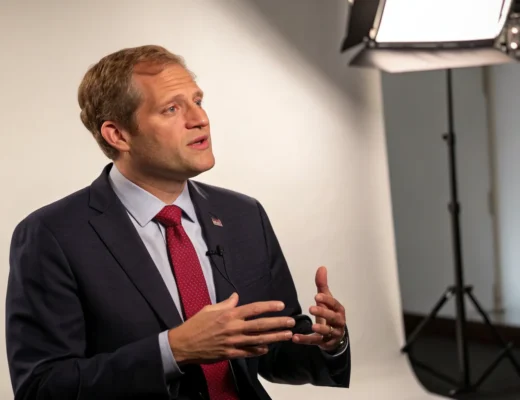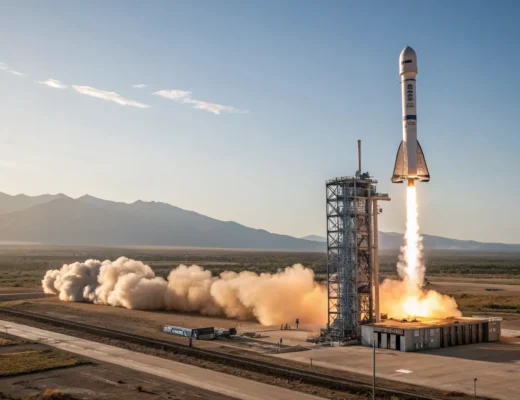Bringing It Home: How LIS Technologies Is Reviving US Nuclear Enrichment
by / ⠀News / October 11, 2024
With overstressed electrical grids, national security concerns, climate change, and increasing geopolitical tensions between the US, Russia, and China, ensuring energy independence for the United States has never been more crucial.
To reach this goal, many believe that a shift away from fossil fuels and toward nuclear power is a logical step, and there’s no shortage of companies already working on powerful reactors. However, these companies face an emerging problem: the difficulty of finding nuclear fuel for those reactors. LIS Technologies Inc., a US-based laser uranium enrichment company, just might have the solution.
The founders of LIS Technologies are two experts in uranium enrichment and nuclear technology. CTO Dr. Jeff W. Eerkens is a nuclear engineer known in the field as the “Father of Laser Enrichment”, with 60 years of experience. Christo J. Liebenberg is a laser scientist with more than 30 years of experience with laser enrichment on 3 different continents, to serve as the CEO of LIS Technologies.
Many people are familiar with the basic concepts of nuclear power, but fewer are knowledgeable about nuclear fuel. Nuclear reactors—the devices that ultimately create nuclear power—run on uranium. However, natural uranium has a very low concentration of U-235, a specific uranium isotope. In order to effectively power a nuclear reactor, uranium needs a higher concentration of U-235 than can be found in nature.
Uranium enrichment is a process that increases the amount of U-235 in uranium, making it an effective fuel for nuclear reactors. LIS Technologies uses lasers to selectively excite and separate U-235, thereby enriching natural uranium to eventually supply fuel for US-based nuclear reactors. But why is this technology important? And more specifically, why is it important now?
Liebenberg explains that LIS Technologies is reviving a technology (CRISLA) that was demonstrated in the early 1990’s, but was abruptly halted in the early 1990s, when the United States began importing enriched uranium instead of creating it. “Russia is a huge producer of enriched uranium, and once the iron curtain came down, they started flooding the world markets because they needed to boost their economy,” he says. “They sold enriched uranium for less than half price compared to what it was. That sunk many, many technologies. That’s why the whole US nuclear industry came to a standstill. It totally destroyed the US nuclear industry.”
That was by no means a minor change. “We were the world’s biggest exporter of nuclear fuel and nuclear services,” he continues. “Today, we are the world’s biggest importer of all of that.”
Liebenberg stresses that his company is not inventing a new technology, it is developing the CRISLA technology that was invented and demonstrated by Dr Jeff Eerkens in the 80’s and early 90’s, and since has been refined resulting into a US patent filed in 2019. The company’s mission is a timely one. With escalating geopolitical tensions and US sanctions imposed against Russia, reviving the domestic production of nuclear fuel is becoming a matter of national security. In May 2024, the United States banned the importation of nuclear fuel from Russia. The ban aimed to protect the interests of the United States, but it has created a problem for the scientists developing the nuclear reactors of the future. Those reactors need fuel to run, and since the United States has relied almost entirely on imported fuel for decades, that fuel has abruptly become scarce.
“With this kind of deficiency, there’s a bottleneck,” Liebenberg says. “None of the small modular reactor (SMR) or microreactor companies know where they’re going to get their advanced fuel from. They’re all building these billion-dollar reactors, their single biggest risk is the availability of HALEU (high assay low enriched uranium), which has an enrichment level of up to 19.75%. The CRISLA technology is ideally suited to produce HALEU fuel, and LIS Technologies Inc is the vehicle that will bring the technology into production in the 2030’s and beyond.”
Enriched uranium could support domestic innovations in nuclear power. However, outside observers might wonder whether companies could use that same technology to create nuclear weapons. The answer is yes, but Liebenberg is adamant that LIS Technologies won’t be venturing into that world and is working closely with the government agencies to protect the technology.
“We’re not looking to go beyond 20% [enrichment] because of proliferation concerns,” he says. “That’s not part of our game plan. We’re building nuclear fuel for peaceful use.”
Of course, if the methods and trade secrets the company relies on become known, bad actors could use them for other purposes. “Our intentions are to do this only for peaceful applications, but if this technology comes out, a foreign actor might use that technology for not-so-peaceful purposes. That’s why this technology will have to be protected.” Liebenberg notes that the technology will be classified to protect it from falling into the wrong hands and that LIS Technologies will focus on rebuilding US energy independence.






